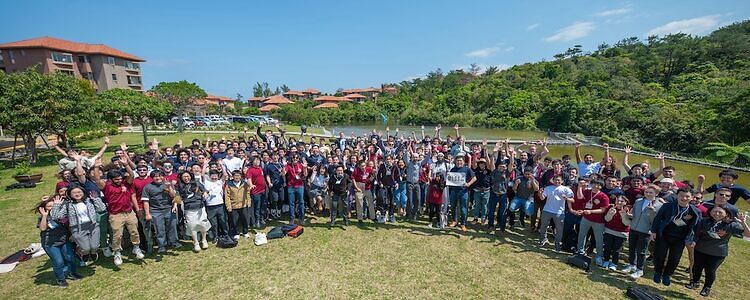The Machine Learning Summer School in Okinawa 2024
March/04 (Mon) - March/15 (Fri), 2024, OIST conference center
by the Okinawa Institute of Science and Technology (OIST) and RIKEN AIP.
News
- Most of the lectures are available on the program page! Please check it!
- One of the participants summarized MLSS 2024 Okinawa and put it on youtube! Thanks!
- MLSS2024Okinawa is successfully finished!!!
- Dec 18th. The lecturer of optimization has been changed to Prof. Francesco Orabona!
- Nov 1st. Prof. Suvrit Sra has joined as a lecturer!
- Oct 23rd. Prof. Kun Yuan has joined as a lecturer!
- Oct 10th. The deadline for cv, supplement, and letter has passed! Thank you so much for the large number of submissions!
- Oct 1st. The deadline for abstract submission has passed!
- Sep 26th. Prof. Shai Ben-David has joined as a lecturer!
- Sep 7th. Prof. Kenji Fukumizu has joined as a lecturer!
- Sep 6th. Prof. Kenji Doya has joined as a lecturer of Brain-inspired AI!
- Aug 27th. The speaker's list has been updated.
- Aug 24th. Prof. Gitta Kutyniok (LMU, München) has joined as a lecturer of deep learning theory!
- Aug 20th. Prof. Diyi Yang (Stanford) has joined as a lecturer of natural language processing!
- Aug 15th. Prof. Tatsunori Hashimoto (Stanford) has joined as a lecturer of large language models!
- Aug 12th. Prof. Amy Zhang (UT Austin) has joined as a lecturer of reinforcement learning!
- Aug 1st. The submission site is now open!
Poster awards
Best poster awards
- Charles Riou (The University of Tokyo) “The Survival Bandit Problem”
- Josh Givens (University of Bristol) “Score Matching with Missing Data”
- Isabella Karabinas (Tri-Institutional Weill Cornell/Rockefeller/Sloan-Kettering) “Machine-Learning-Based Biomarkers for Depression: Can EEG Improve Treatment Predictions?”
Honorable Mention Awards
- Jan Niklas Böhm (Universität Tübingen) “Unsupervised visualization of image datasets”
- Soumya Mukherjee (Pennsylvania State University) “Computationally Efficient Spectral Regularized Kernel Two-Sample Test”
- Kibidi Neocosmos (International Max Planck Research School for Intelligent Systems) “Coarsening the European Electric Grid with Graph Neural Networks for Power System Analysis”
Award Finalists
- Anna Emilie Jennow Wedenborg (Technical University of Denmark) “Efficient Closed Form Updates for Archetypal Analysis: A Generic Framework for Tailored Data Distributions”
- Pragya Singh (IIIT-Delhi) “Way forward – Wearable AI for Mental Health”
- Emmanuel Esposito (Università degli Studi di Milano, Istituto Italiano di Tecnologia (IIT)) “On the Minimax Regret for Online Learning with Feedback Graphs”
- Hannah Nemeth (Rensselaer Polytechnic Institute) “Inducing Seizures in Recurrent SNNs Trained for Auditory Localization and Detection”
- Rita González Márquez (University of Tübingen) ” Enhancing Language Model Representations through Self-Supervised Learning for Document-Level Analysis”
- Paul Haüsner (Uppsala University) “Neural incomplete factorization: learning preconditioners for the conjugate gradient method”
The machine learning summer school (MLSS) series was started in 2002 with the motivation to promulgate modern methods of statistical machine learning and inference. It was motivated by the observation that while many students are keen to learn about machine learning, and an increasing number of researchers want to apply machine learning methods to their research problems, only few machine learning courses are taught at universities. Machine learning summer schools present topics which are at the core of modern Machine Learning, from fundamentals to state-of-the-art practice. The speakers are leading experts in their field who talk with enthusiasm about their subjects.
The Okinawa Institute of Science and Technology Graduate University (OIST) is a dynamic new graduate university of science and technology in Okinawa Prefecture, Japan. The university is located on 85 hectares of protected forestland overlooking beautiful shoreline and coral reefs. The campus is striking architecturally, and the facilities are outstanding. There are no academic departments, which facilitates multidisciplinary research. Outstanding resources and equipment are provided and managed to encourage easy access and collaboration. English is the official language of the University, and the university research community is fully international, with more than 50 countries represented. OIST is rapidly gaining recognition in the worldwide academic community as a model for excellence in education and research.
![]()
The RIKEN Center for Advanced Intelligence Project has been launched since April 2016 with the subsidy for “Advanced Integrated Intelligence Platform Project (AIP) -Artificial Intelligence/ Big Data/ Internet of Things/ Cybersecurity-.” from the Ministry of Education, Culture, Sports, Science and Technology. Our center aims to achieve scientific breakthrough and to contribute to the welfare of society and humanity through developing innovative technologies. We also conduct research on ethical, legal and social issues caused by the spread of AI technology and develop human resources.






